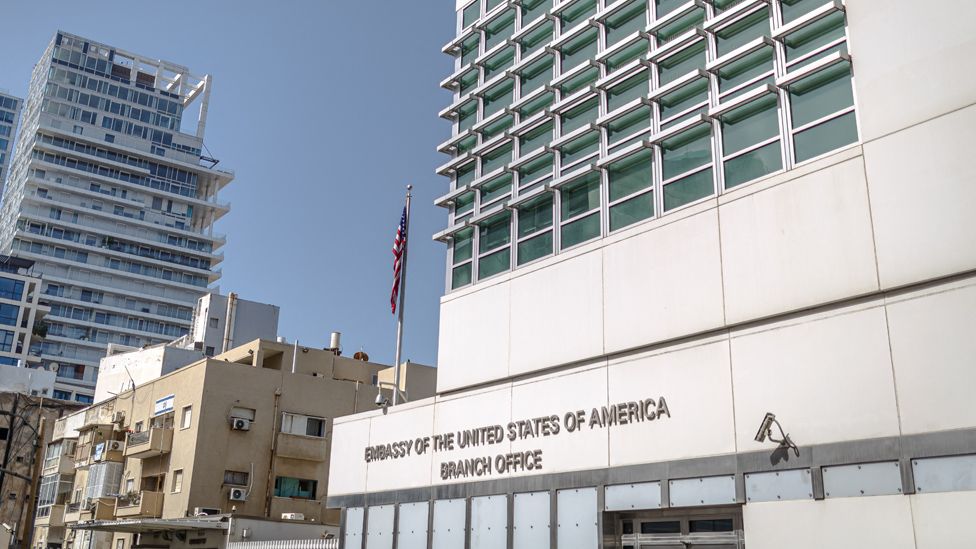US restricts travel for diplomats in Israel amid fears of Iran attack
 Amid concerns of a potential attack by Iran, the United States has imposed travel restrictions on its embassy personnel in Israel. The US embassy has instructed its staff to refrain from traveling outside the broader Jerusalem, Tel Aviv, or Beersheba regions "out of an abundance of caution."
Amid concerns of a potential attack by Iran, the United States has imposed travel restrictions on its embassy personnel in Israel. The US embassy has instructed its staff to refrain from traveling outside the broader Jerusalem, Tel Aviv, or Beersheba regions "out of an abundance of caution."
The move comes in the wake of escalating tensions between Iran and Israel following an incident where Iran accuses Israel of launching a strike on its consulate in Syria, resulting in the loss of 13 lives. Iran has vowed retaliation for the attack, placing further strain on the already tense relationship between the two countries.
In response to the heightened tensions, UK Foreign Secretary Lord Cameron has reached out to his Iranian counterpart, urging restraint and cautioning against any actions that could lead to further escalation of hostilities.
While Israel has not officially claimed responsibility for the consulate attack, it is widely believed to have been involved. This incident underscores the volatile geopolitical landscape in the Middle East and the delicate balance of power between regional actors.
Israel launched an airstrike on the Iranian consulate in Syria, killing high-ranking Iranian military officials. This included a senior commander of the Quds Force, a powerful Iranian unit.
Iran backs Hamas, a Palestinian group fighting Israel, and other anti-Israeli groups in the region, like Hezbollah in Lebanon. These groups frequently attack Israel.
The consulate attack disrupts ongoing diplomatic efforts to prevent the war in Gaza from spreading. The US fears Iran might retaliate with a major attack.
Both US President Biden and Israeli Prime Minister Netanyahu issued strong warnings. Biden pledged unwavering support for Israel, while Netanyahu vowed a harsh response to any Iranian attack.
"We are prepared to meet all of the security needs of the State of Israel, both defensively and offensively," he stated.
Erik Kurilla, the general in charge of US operations in the Middle East, is in Israel to discuss security concerns with officials.
The visit was originally planned, but the Pentagon stated that it was moved up "because of recent developments."
Lord Cameron stated that he had "made clear... that Iran must not draw the Middle East into a wider conflict" after speaking with Hossein Amir-Abdollahian, the Iranian foreign minister, over the phone.
"I am deeply concerned about the potential for miscalculation leading to further violence," he stated.
Speaking with the foreign ministers of China, Saudi Arabia, and Turkey, US Secretary of State Antony Blinken made the case that more escalation serves no one's interests.
China condemned the strike on Iran's embassy building in Damascus, which is largely thought to have been carried out by Israel, and encouraged the US to play "a constructive role" in the Middle East after the call.
It's unclear how any retaliation would be carried out and whether Iran would launch it directly or through one of its proxies.
An Iranian official declared on Sunday that Israel's embassies were "no longer safe" and hinted that a consulate building would be a potential target.
Israeli defence minister Yoav Gallant has told his US colleague that "any direct Iranian attack" on Israeli soil would "require an appropriate Israeli response against Iran".
Responding to a question on Thursday regarding the travel restrictions, Matthew Miller, a spokesman for the state department, stated that while he would not reveal the "specific assessments" underlying them, "clearly we are monitoring the threat environment in the Middle East and specifically in Israel."
The Israeli government has raised the "possibility of an attack on Israeli territory from Iran, and that such an attack could trigger wider escalation," according to an updated travel advisory from the UK Foreign Office.
The Foreign Office has issued travel advisories for vast portions of the Occupied Palestinian Territories and Israel since the attack on October 7th, which was spearheaded by Hamas.
Similarly, the French government issued a warning, advising its people to "imperatively refrain from travel in the coming days to Iran, Lebanon, Israel, and the Palestinian territories".
The German airline Lufthansa has decided to keep its flight ban to Tehran, the capital of Iran, in effect until this Saturday.
After entering Israel from Gaza, gunmen killed 1,200 people and kidnapped over 250 more during the October onslaught.
According to Israel, at least 34 of the 130 hostages who are still in Gaza are dead.
The health ministry operated by Hamas reports that over 33,000 Gazans, mostly civilians, have died as a result of Israel's ensuing offensive in Gaza.

















![[LIVE] Engage2Earn: Shayne Neumann MP Blair boost](https://cdn.bulbapp.io/frontend/images/d0ae7174-2ceb-4eed-9844-e1c262a4013e/1)
























